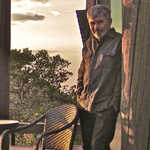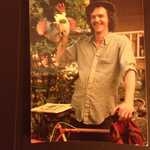The first time I meet Hippo he passes me going up the mountain. He’s wearing a red star military cap and a shirt with Fidel Castro’s face on it, has got his earbuds in and is singing in Spanish as he dances effortlessly along the trail. I, on the other hand, have stopped for breath and water. Hippo points up, the ruins are just ahead. “Si se puede,” he says. Yes you can.
By the time I reach the ruins I see Hippo again, this time holding a bundle of yellow wildflowers. February is a very romantic month here in Pisac, he tells me. Not because of Valentine’s but because that’s when all the flowers are in bloom; the ones in his hand are for his mother. He asks if I’m going to keep going to see the old prison and military barracks, and I say maybe I’ll walk for a little bit then turn back, because the light’s starting to go and gray clouds are hanging over the surrounding mountains.
Hippo points out three ways back: one the way I came, one along a thin river that flows down the valley between our mountain and the next over, and a third looping down and around to a side road into town. He takes a picture of me that I will send to my parents a few days later, and I thank him and move on. I sit on a bench, sit on rocks, say buenas tardes to people passing me on their way down. I see Hippo here and there, lingering, talking to the tourists, yellow flowers in tow.
By the time I’m ready to turn back, he’s on his way down, too. Let’s go together, he says. Just as we start, Hippo stops to talk to another guy, a Canadian. I miss most of the conversation, but they speak for long enough to suggest they might know each other. I approach them and he asks the both of us if we want to go see some of the other ruins then follow him down along the river in the dark. Canuck and I look at each other. Yes, we say. Of course.
His name is Hipólito. Some people call him Lito, others call him Hippo, which is also his favorite animal. Once he was working at a restaurant in Spain for two weeks and there were four beautiful Russian girls working there too, and they couldn’t pronounce his name so he got them to call him Papacito instead, much to the chagrin of the Spaniard waiters who’d been wooing the girls for months and had been rude to him pretty much from the start. “We go to Spain and people there do not like us very much,” he tells us (though he’s quick to caveat the generalization). “They say we are ruining their culture …” Hippo trails off, leaving us to fill in the six hundred years of irony.
We get to a fork in the trail. “Do you want to go the easy way or the local way?” Hippo asks. The local way, Canuck says. I nod. We climb. Hippo shoots ahead, with the wildflowers tucked into a belt loop at his back. He grew up in Pisac, would go into the mountains for hours, days at a time as a kid. He knows the position of every rock. He’s wearing a pair of new slip-on sneakers that seem untouchable by mud. The local way takes us through a narrow cave, barely wide enough for Canuck and I to fit through with our packs. We come out the other side to a small ledge surrounded with low brush. Young people like to come up here, Hippo says, because from the angle their parents can’t see them from the base. We keep climbing, to several circles of ruins at the top. Stacks of cairns on the old Incan foundation walls. The surrounding valley is grayed over with clouds, but you can come up at five, six in the morning like some of the locals to meditate and watch the sunrise. It’s … Hippo makes a universal sound of speechlessness. Canuck says “wow” the same way my dad does: with the last w dropped, so his mouth hangs open after he says it and it comes out more like wao.
We call this in Quechua, Pachamama, Hippo says. In Spanish it’s Madre Tierra. In English, Mother Earth. I spread my arms wide and scream at the top of my lungs, PACHAMAMA!
A year ago Hippo was up here for a morning walk and he came across a meditating Robert Smith. He recognized the hair—his brother loves The Cure—and approached the musician and said to him, “I don’t want to bother you and ask who you are, I just want to tell you that today is Friday in Love.” Robert Smith thanked him, and gave him his shirt and tickets to his show in Lima, where in the first encore Smith played the opening chords of “Dressing Up” using a zampona—a traditional Andean pan flute.
Years ago Hippo worked for the Cuban government, and he waxes poetic about meeting people in Bolivia, in Venezuela, about arriving at the airport in Havana and being picked up in a van and greeted by the Cuban men and told, immediately, “You and I, we are brothers now. What would you like to see?” Hippo quotes Dylan, Marley, Mother Teresa. The best religion, he says, is Love. He talks about meeting people from different parts of the world on these mountains, draws a circle in the dirt and points to it and says, Pachamama. He sings in Spanish as we work our way down and back around and says out loud, as if it were some kind of mantra, Pachamama Madre Tierra Buddha Che Guevara.
A plane flies overhead. It’s carrying drugs. You can tell, Hippo says, from the direction it’s flying—no commercial planes fly that way. In recent years Peru’s become even bigger than Colombia in the drug trade. Wao.
We walk in the dark, Hippo in the lead, his arms waving out at his sides like a tightrope walker, but more like a kid pretending to be tightrope walker on a seam in the sidewalk. Canuck and I trail behind with our iPhone flashlights, catching moths and drops of rain in the beams. It’s getting wetter, slipperier, the sound of rushing water getting louder as we meet the river we’re to follow back to town. I slip a couple times and we hold our lights with our chasm-side hands to leave the opposite open to brace for support along the rocky wall.
Apu, Hippo says, is Quechua for mountain.
Canuck asks: How do you say “how do you say” in Spanish?
“Como se dice.”
“Como se dice river.”
“Rio.”
“Como se dice este rio?”
“Rio Peligroso. Dangerous river.”
“I like you guys,” Hippo says. “Sometimes the tourists who come up, they think I want their money, I say hello and they are like no thank you and they go away. Or the women think I am trying to, how do you say—do not give permission to have sex with someone.” “It’s a shame that it’s come to that,” Canuck says, “that that fear is the thing we default to.” Once, Hippo was coming down the mountain when he passed a tourist girl on the way up by herself. He said to her, in English, that it was getting dark and she might want to head back. She thanked him but ignored his advice and hours later, he saw, going up the mountain, a string of fire trucks. Wao.
Thunder. Canuck and I wipe our glasses with our undershirts. He stops to slip a waterproof cover over his pack. He grew up on a farming co-op that spawned from The Farm, and when he was young he would get a funny feeling in his gut right before a storm. “I still feel it sometimes,” he says. When the storm came, he and his brothers would strip naked and run out into the fields in the pouring rain and yell and curse at the lightning.
Hippo asks me where I’m from. I tell him New York, Brooklyn. “Ah Brooklyn!” He knew a girl from Brooklyn who worked on Wall Street. Took her hiking on the mountains and when he offered her his water bottle, she asked if he had a glass. Hippo laughs, “A glass!” He asked her if she wanted to go to the summit and she asked where they could catch a taxi. “I say to her, You go find a taxi and I will meet you up there in eight hours,” Hippo laughs again. “After that day we do not talk for two years and then she sends me an email and asks me how I am doing!” Hippo shakes his head and says in the sing-songy voice, Brooklyn!
Another time he met three British women on the mountain and they invited him to dinner. “It was the most miserable night of my life,” Hippo says. “They all went to prestigious schools—Oxford, Harvard—and all they could talk about was, I got my degree in this and I went to school in there. All, I am, I am, I am, and I say to them, I am sorry but this is the worst dinner of my life. I do not care about your bachelors or masters or PhDs”—the lights of the town below us are coming into view—”The most important is a degree in the heart.”
At the foot of the mountain, Hippo and Canuck turn toward the door of hostel. Hippo’s family owns it, and Canuck is staying there. The last shared ride to Cusco is about to leave, but I decide to stay and Hippo offers me a bed. We meet in the kitchen and his relatives give us a couple avocados picked from the tree in the courtyard. They’re the size of racquetballs and are intensely nutty, full of flavor. Canuck shares some carrots he bought at the market and we make coca tea. The three of us sit and talk for hours—mostly Hippo talking, though—about his protesting a McDonalds in London and getting arrested for several hours. About their belongings getting stolen from their flat on the same trip (“And we are supposed to be in one of the safest cities in the world!”). About the disconnect between people and their food, people and their work, the corrosive effect of industrial tourism. “Sometimes I meet kids who are here ‘volunteering’,” Hippo says. “How are you volunteering? Teaching English. Okay. But then they just go out at night and drink and party and the next day teach their English class and they are how do you say—” “Hangover.” “Yes, hangover.”—shakes his head—”You have to respect my culture! If I come to your house, I have to respect the rules of your house. If you come to my house you have to respect my rules. You have to respect my culture!”
There was an American woman in town who’d bought and opened a yoga studio and a couple of hostels, whose solution, in lieu of getting involved in the community, was just to throw money at everything. “People in town came to me and they say to me, Hey Lito, you can speak English, you can talk to her for all of us. So I go and talk to her in Spanish, in Quechua, in English, in three languages, and she still just wants to just throw money at us, so I finally told her to take her money and shove it up her pussy.”
Maybe it’s the lighting in the kitchen and the sweater he put on, but Hippo suddenly seems five years older than he did on the mountain. He’s thirty, same as me, and he’s a dentist. He has a practice where he treats those who live in the smaller villages in the mountains for free. The next morning he will show me the small office attached to his family’s hostel. There will be pictures of his heroes on the wall near the entrance, a picture of him with Che Guevara’s daughter. There will be a dental chair that looks and works like any other dental chair except that he and his friends built it for a fraction of the price using discarded sheet metal and crowd control railing and electronics they wired themselves to a control panel housed in the shell of an old two-burner gas cooktop. He will show me the local ingredients, the natural anesthetics he uses, will tell me how he teaches the people in the mountains to make their own toothpaste. Wao.
The same night at the kitchen table, before we turn in, Hippo recounts one last story. “There was a woman from London here. I guide her down the mountain at night, just like you. And just like you she missed her bus and stayed in the hostel, and we sat in this kitchen and I make her tea, just like you. And then she started crying. I ask her, Why are you crying, do you need something? And she say she hates her quality of life in London. She goes to work and sits Monday through Friday and goes out to the pub after work on Friday, and maybe she have dinner Saturday night, and on Sunday she washes her clothes. She cried and she say all she does every week is wait for Friday to come.”
He asked her about her diet—fish and chips, fast food—told her that was the first thing she needed to change. He introduced her to quinoa, and maca (the Andean flax seed), sent her home with bags of the stuff. He found out recently that she’s changed her life and is eating healthier. She sent him a picture, too—she had lost a lot of weight. She’d quit her office job, started working with children, doing physical therapy. “And she also told me,” Hippo says, “She met someone and fell in love, and very recently”—he makes a gesture with his ring finger—”How do you say …”
There’s more to the conversation here, as there always is, but my memory of it starts to blend and blur with the fatigue. I remember talk of inertia and Indians and GMOs. I remember listening to the rain come down outside, and Canuck’s traveling companion dining outside the door with a white-haired man named Ivan who makes clay flutes in the shape of mourning doves. But we’re tired from the day, from the hike, we wash our plates and mugs in the sink and hug goodnight. If you’re ever in New York … If you’re ever in Canada … If you want to go salsa dancing in Cusco next week …
“Como se dice, brothers?”








